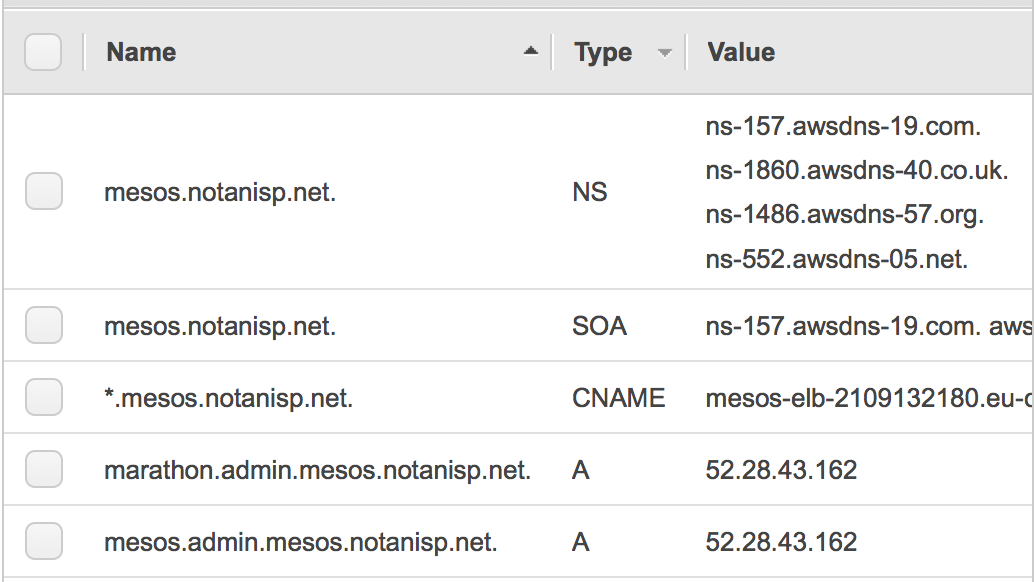Ecosyste.ms: Awesome
An open API service indexing awesome lists of open source software.
https://github.com/bobtfish/tf_aws_mesos
https://github.com/bobtfish/tf_aws_mesos
Last synced: 19 days ago
JSON representation
- Host: GitHub
- URL: https://github.com/bobtfish/tf_aws_mesos
- Owner: bobtfish
- License: apache-2.0
- Created: 2015-04-05T09:46:19.000Z (almost 10 years ago)
- Default Branch: master
- Last Pushed: 2015-04-11T23:12:46.000Z (almost 10 years ago)
- Last Synced: 2024-12-05T00:09:34.498Z (3 months ago)
- Language: Makefile
- Size: 570 KB
- Stars: 12
- Watchers: 2
- Forks: 2
- Open Issues: 0
-
Metadata Files:
- Readme: README.md
- License: LICENSE
Awesome Lists containing this project
README
# Terraform AWS Mesos
## Module to set up a Mesos cluster on AWS using Terraform
See my blog post for more detailed information / walkthrough: http://bobtfish.github.io/blog/2015/04/06/diy-scalable-paas-with-terraform/
## Example Use
Create a file `mesos.tf` containing something like this:
module "mesos" {
source = "github.com/bobtfish/tf_aws_mesos"
slaves = "5"
region = "${var.region}"
admin_iprange = "${var.admin_iprange}"
admin_key_name = "${aws_key_pair.admin.key_name}"
private_subnet_ids = "${module.vpc.primary-az-ephemeralsubnet}"
public_subnet_ids = "${module.vpc.primary-az-frontsubnet}"
domain = "${var.domain}"
vpc_id = "${module.vpc.id}"
vpc_iprange = "${module.vpc.iprange}"
discovery_instance_profile = "describe-instances"
}
See the `variables.tf` file for the available variables and their defaults
## Outputs
* mesos_elb_dns_name - The DNS name of the externally facing ELB
* mesos_elb_id - The AWS id of the externally facing ELB
* marathon_api - The full URI for the marathon web interface / API
* mesos_api - The full URI for the mesos web interface
* domain - The domain under which applications can be requested
## Visit the web interfaces
When the cluster is set up, you need to [retrieve the NS server records for your _domain_ from route53, and add delegations
to this new subdomain from the domain you own (wherever that is managed):

After which, you should be able to visit the admin interfaces at:
* mesos.admin.yoursubdomain
* marathon.admin.yoursubdomain
You can launch marathon apps using the API (or the web interface) as per [this guide](https://www.digitalocean.com/community/tutorials/how-to-configure-a-production-ready-mesosphere-cluster-on-ubuntu-14-04), and each app's PORT will be made available via HTTP at the name of the app. For example the marathon app named _/www_ becomes _www.yoursubdomain_
## To do
* Currently no way to retrieve the address of the DNS servers for the Route53 zone through Terraform. Use the Console to retrieve the addresses.
* Cannot reach the log files of the Mesos slave nodes from the web interface
* Whilst the cluster we build is redundant, currently all the machines are allocated in a single availability zone.
* The machines have no configuration management (no puppet/chef), which means that making any changes to them (or getting any security updates) involves rebuilding the instances.
## Credits
This module is based on the code from ContainerSolutions, and their excellent GCE howto: